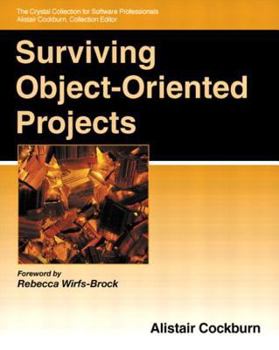Surviving Object-Oriented Projects (Agile Software Development Series)
(Part of the Agile Software Development Series Series)
While books on software engineering and project management abound, Alistair Cockburn's Surviving Object-Oriented Projects stands out as a lively view from the trenches of project management. It... This description may be from another edition of this product.
Format:Paperback
Language:English
ISBN:0201498340
ISBN13:9780201498349
Release Date:January 1998
Publisher:Addison-Wesley Professional
Length:272 Pages
Weight:1.05 lbs.
Dimensions:0.6" x 7.2" x 9.3"
Related Subjects
Agile Business Business & Finance Business & Investing Computer Science Computers Computers & Technology Economics Management Management & Leadership Mathematics Methodology Object-Oriented Design Object-Oriented Software Design PMP Exam Project Management Science & Math Software Software Design & Engineering Software Design, Testing & Engineering Software Development Software EngineeringCustomer Reviews
5 ratings
Sound advice for the first steps in moving to OOT
Published by Thriftbooks.com User , 22 years ago
Even though it was written in 1998, the advice in this book has not diminished with age. There are many claims made about the advantages of moving to object-oriented technologies (OOTs), and while most are true, the difficulties are almost always understated. Not in this book. Cockburn is very explicit in his descriptions of how complex the move is and how valuable training can be, as well as the many inherent limitations that it has. As the title explains, this is not for developers, but for the manager who is either contemplating the use of OOTs or is faced with the tasks of implementing them after the decision has been made. Several projects are examined, some of which were successes, others which were simply survived by the participants and a few that crashed and burned. In my experience with working with developer teams, the hardest task of all in moving to OOTs is not making the decision to make the move or in getting the initial training. The fact that there are benefits is clear and trainers are relatively easy to find. The hardest part is choosing where to begin the transfer of their legacy systems to an object-oriented form. This is something that is difficult even for those experienced in the transfer and for someone still unfamiliar with OOTs it can be intimidating. It is this group of people who will obtain the most benefit from the book. Cockburn clearly has a great deal of consulting experience in helping people make the transition and he passes that on using a very readable style. He also is very explicit in pointing out potential problems with the move. Moving to any new technology is difficult, and nearly everyone needs help to make it successful. While reading this book will not guarantee that your move to OOTs is successful, it will make it more likely.
Essential reading for OO management
Published by Thriftbooks.com User , 25 years ago
This book is essential reading for anyone interested in running an OO project, or for anyone who simply wants a balanced view of OO development. Unlike most other OO authors I've encountered, Alistair Cockburn is not interested in selling OO as the answer to all our prayers, but uses a wealth of case studies to show us the limits, pitfalls and negative side of OO development, as well as the benefits. Perhaps because of this, he doesn't ignore the management aspects of development, most of which are common to OO and non-OO projects. The book is also well presented and well written, and even has a sprinkling of humour. I particularly like his term "PolyBloodyHardReuse", the meaning of which will be obvious to anyone who's ever seen attempts to introduce software reuse into an organisation.
I wished I read this book two years ago....
Published by Thriftbooks.com User , 25 years ago
Simply said, I loved this book!This book provides ALL kind of managers as well as team members with VERY valuable information about the project process, project control, pitfalls and ways to (bigger chances on) success.I wish we had read this book two years ago when we updated our software to a GUI-environment. Pitfall after pitfall were encountered, already clearly written down in this book. Reading it beforehand, might have saved the project...Thanks Alistair, for writing this book! Please keep writing...
Experience proved it works
Published by Thriftbooks.com User , 25 years ago
The book is permeated with loads of practical, advice ranging from everyday tricks to long-term management. Experience with several projects in our company has proved that transition to objects is tremendously hard, but also that the advice contained in the book works.
Working with Object Technology? Read the Book!
Published by Thriftbooks.com User , 27 years ago
Surviving Object-Oriented Projects is a must-read for all people working with Objects or thinking about adopting Object Technology. It gets down to the practical, pragmatic issues that object projects face, and provides sound, experience based strategies for addressing these issues. For anyone in the process of adopting Object Technology, this book gives the real information about OO Methodologies, it is not the notation that is important, what is important is how you organize to deliver the system. This book is a great successor to the book "Object Solutions" by Grady Booch, and it will make a great companion book to the "UML Distilled" book by Martin Fowler. It replaces "Object Solutions" because it is targetted at medium sized, time-to-market critical projects, drawing practical hints and tips from a wide range of object projects. It fits well with "UML Distilled" since both authors favor using just enough process to be effective, and always remember to counteract the OO hype with a solid reality check.





